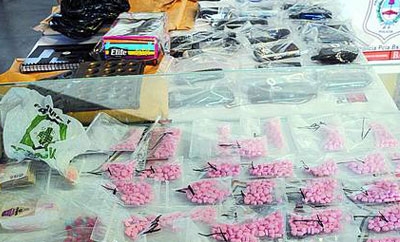Authorities in Argentina have arrested a man posing as the head of a travel company to sell synthetic drugs at parties around Buenos Aires and in neighboring countries, as an unprecedented case involving domestic party drug production continues to unfold.
In a series of nine raids around Buenos Aires, police dismantled seven drug laboratories and seized 12,293 ecstasy tablets, 28 liters and 1,240 doses of ketamine, 2.3 kilos of cocaine, 300 LSD tabs, and 200 doses of ephedrine, worth a total of almost $16 million, reported La Nacion.
Police arrested five suspects, among them Raul Martin Maciel, who had claimed to be a director of student travel agency Travel Rock, and Julio Cesar Martinez, who was arrested and subsequently released in September in connection with the same case, reported Clarin.
According to investigators, Maciel led a drug trafficking operation that sold synthetic drugs at electronic parties and clubs around Buenos Aires and other parts of the country, and exported them to other countries including Bolivia, Uruguay, Paraguay, Chile and Brazil. The directors of Travel Rock have denied any links to the case, stating that Maciel was not one of the 27 company directors.
The seizures and arrests are the latest developments in a case that emerged in late September after authorities discovered an ecstasy laboratory in Buenos Aires run by a Spanish citizen, where they seized some 25,000 ecstasy tablets. According to Clarin, the newly uncovered factories were dedicated to producing horse tranquilizer ketamine.
InSight Crime Analysis
The discovery that Argentine drug traffickers have begun producing synthetic party drugs domestically, instead of importing them as in the past, underscores the growing and profitable local market for the drugs. According to the United Nations Office on Drugs and Crime, young people in Argentina, Uruguay, Chile and Colombia are the biggest ecstasy and amphetamine consumers in the region.
The latest developments of this case exposes a well-organized horizontally integrated network involved in producing, transporting and distributing the drugs, suggesting networks dedicated to supplying this market are becoming increasingly sophisticated.
It is also another sign that Argentina lacks adequate mechanisms to combat the flow of chemicals used in synthetic drug production. The country has become a major center for precursor chemicals used in cocaine production and also an important transit point for chemicals used to produce methamphetamine.

